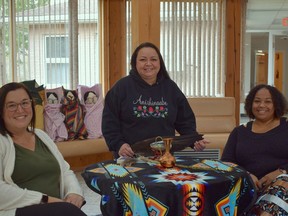Agency asks: Can you provide a foster home to Indigenous youth?

Article content
A foster parent to two kids, Tania McCormick’s only regret is not becoming one sooner. But after caring for Indigenous children in need of support, both at home and at work, she felt compelled to help others do the same.
“Once I started getting my first foster kids, I realized that I couldn’t bring all of the foster kids home with me,” said McCormick, whose spirit name is Biidaankwat (Stormy Clouds are Coming). “The next best thing was to help all of the foster kids find homes like mine.”
McCormick, who’s from Serpent River First Nation, is one of three women leading the Alternative Care foster care program at Mnaasged Family and Childcare Services at Munsee Delaware Nation, about 30 minutes southwest of London. The child wellbeing agency supports families, youth and children from First Nations across Southwestern Ontario.
The Alternative Care team works with the Children’s Aid Society to place kids in homes and protect Indigenous children and youth up to age 18, from Windsor east through St. Thomas and parts of Elgin County. The program received its foster care licence approval this year from the Ministry of Children and Youth Services and is set to have full agency status as a Children’s Aid Society by 2024.
“We’re in the stage of needing to recruit foster homes, so that’s really where the need is right now,” said Kyleigh Alexander, the program’s supervisor.
“There’s always the need of children,” she said. “That, unfortunately, doesn’t go away. But we really need the homes to support the children.”
The implementation of alternative care comes on the heels of new legislation introduced by the federal government to reduce the over-representation of Indigenous children and youth in care, which Alexander noted, is a number higher than the number of children who attended residential schools. Despite making up roughly seven per cent of Canada’s youth population, Indigenous children account for 52 per cent of kids in private foster care homes, according to figures from the 2016 census.
The hope of Alternative Care — once a designated agency — Alexander said, is “to bring Indigenous children back into their communities,” and ultimately, she added, restore First Nations jurisdiction over child and family services. “Our goal is to create healthy families and healthy children, breaking the cycle of the need for child welfare,” she said.
Unlike traditional foster care systems, Mnaasged’s foster care program uses an educational and relationship-based approach to recruit and support foster parents, McCormick said.
“The difference here is, when I do a home visit with a potential foster family, I’m going in there with the idea that I’m meeting a new friend,” she said. “We’re having coffee and we’re just interacting and having a conversation. I don’t have any boxes to tick off. I have criteria that I need to talk about and understand …. but it’s not so invasive and abrupt,” she said referring to the process she went through to foster her children.
Through their training program — called Heart and Spirit — parents will learn how to create a culturally sensitive environment for their foster children and receive education from designated Indigenous knowledge keepers and staff, she said. The heart component refers to the individual learning offered during home visits with the foster family, while the spirit session involves group learning, a large part of which focuses on connecting children to their Indigenous identity, culture and beliefs.
“For example, if I have children come into care and they want a naming ceremony, then our knowledge keepers have a database of individuals who are capable of doing those for all the (First) Nations in our catchment area,” McCormick said.

Mnaasged works alongside six First Nations including Aamjiwnaang, Kettle and Stony Point, Munsee Delaware, Eelūnaapéewi Lahkéewiit (Delaware Nation at Moraviantown), Caldwell, and Oneida Nation of the Thames.
The program started recruiting foster parents this fall and recently approved their first foster care home, a couple in St. Thomas, Alexander said. Her team is encouraging people, aged 18 and up, of diverse backgrounds to apply to become foster care parents.
“I really want LGBTQ2S-plus families to come forward and say, ‘We want to foster.’ I want (Black, Indigenous and People of Colour) families to come and say, ‘We want to foster,’” McCormick said.
She added: “And I want non-Indigenous families to say, ‘I love your culture and this would be a really great opportunity for me to get to know your culture more, and to help me give back to Indigenous children, especially during a time where we’re still finding out every day about children being found in unmarked graves.’”
—
The Local Journalism Initiative is funded by the Government of Canada
Postmedia is committed to maintaining a lively but civil forum for discussion. Please keep comments relevant and respectful. Comments may take up to an hour to appear on the site. You will receive an email if there is a reply to your comment, an update to a thread you follow or if a user you follow comments. Visit our Community Guidelines for more information.